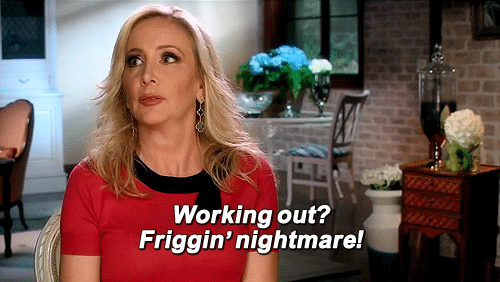With new weight loss tips coming out every week, it's hard to know what truly works when it comes to looking and feeling your best. Do you need to be in the gym for hours a day to reap the benefits? Does it matter if you stick with the same workout routine every day? Are you supposed to go for a sweat sesh on an empty stomach? To make sure that you're really making use of your time in the gym, we talked to Chris Kelly, a CrossFit level one trainer and certified personal trainer in New York City, to debunk those workout myths that are holding you back! If you believe any of these common misconceptions, it's time to erase them from your mind and get back into the gym with a fresh perspective.
Myth 1: Cardio is the only way to lose weight
People think that just because you tend to sweat more during cardio, it means that that's the best way to drop the pounds — but that's just not the case. "Strength training burns more calories over time than cardio," Chris said. Your body's metabolism speeds up for a longer period of time after lifting weights and calorie burning continues hours later.Myth 2: You shouldn't eat before working out
"This one can get a little bit tricky depending on what you're doing," Chris explained. There's a difference between lifting weights and training to run a marathon. But the general rule is to fuel your body properly 90 minutes to two hours before a workout. Two tablespoons of your favorite nut butter along with whole-wheat bread or oatmeal is a great option. And adding a piece of fruit will allow your body to convert the natural sugars into energy easily so that you're ready to go! But steer clear of high-fiber foods, as it can upset your stomach.Myth 3: Lifting weights will make you look bulky and manly
This is probably one of the most widely talked-about workout myths, but it really depends on how much weight and how many reps you're doing. Doing more reps with a lower weight helps you tone, and doing fewer reps with a higher weight contributes to bulking — but only over an extended period of time. Chris explained that adding extra weight to your routine once or twice a week won't suddenly make you bigger, but it will help you develop strength (and who doesn't want that?!).Myth 4: You have to spend hours at the gym to get a good workout
Research says that 10 minutes of exercise at a time, three to five times a day, has major health benefits. "So if your schedule is crazy and you're unable to work out, if you're able to spend 10 minutes before work and during your lunch break, it will help," Chris suggested. The key here is not allowing your body to get bored with the same workout, so switch up which muscle groups you're working out every day over the course of a week.Myth 5: Working out a lot makes up for a poor diet
Not every person benefits equally from the same meal plan and workout regimen, so it's all about finding the ones that works best for you. But it's pretty universal that your body needs lean protein, complex carbs, fruits, vegetables, and healthy fats. So you may be thinking — what about those people who eat donuts every day but still look GQ-worthy? Looking healthy on the outside doesn't necessarily translate to being healthy on the inside. It's a very real possibility that high cholesterol is lurking under a toned body because of a lack of proper nutrition. Chris advises his clients to add something to their diet instead of telling them to give something up. So if chips are their go-to afternoon snack, he tells them to also grab a piece of fruit. Over time people tend to wean off of the chips and make healthier choices.Myth 6: More is better
Depending on your goals, adding more weight to strength training can be counterintuitive. Just because someone is lifting more weight or going longer with cardio doesn't mean that they're benefiting more. Ask someone with big muscles to run on a treadmill and you may just smoke them. "Pick a program that's going to help with all areas of your fitness," Chris said.Myth 7: Being sore after a workout always means that it's working
Some people experience delayed onset muscle soreness — which means that the sore feeling after a workout doesn't kick in until up to 48 hours afterwards. So feeling sore or discomfort after that time raises red flags. "There's a difference between being sore and being in pain," Chris confirmed. To help your body recover properly, there are a few things to remember: don't work the same muscle groups on back-to-back days, eat complex carbs and protein to rebuild the muscles, hydrate, sleep, and stretch.
Image Source: Bravo


